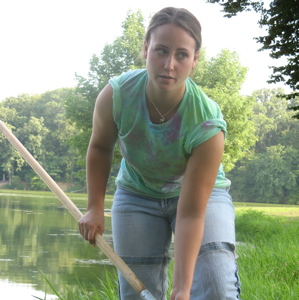

Venture Boldly

Office of Communications
2 East South Street
Galesburg, IL 61401

 Rosemary Ibis '08 says she could always wrap her mind around anything health or environmentally related. "Nursing and the environment are my passions. When I first came to Knox, I took a lot of chemistry courses and thought I would be a doctor, but I have changed that and am pursuing nursing as my career choice."
Rosemary Ibis '08 says she could always wrap her mind around anything health or environmentally related. "Nursing and the environment are my passions. When I first came to Knox, I took a lot of chemistry courses and thought I would be a doctor, but I have changed that and am pursuing nursing as my career choice."
As a biology major, Ibis says she has always thought about ecology. Her senior research "Macroinvertibrates literal zone of strip mine lakes," had Ibis canoeing local lakes, catching bugs and netting macroinvertibrates in the muddy waters near the banks. "That's where they live and most lay their eggs," she says.
Ibis' research is funded by the David Burney Dunn Fund -- a field biology scholarship from the Bernie Dunn family. Ibis is examining the macroinvertibrate numbers and varieties at Green Oaks Biological Field Station, Knox's 760 acre field study center, to Lake Storey in Galesburg.
In addition to her research in the muddy waters, she worked with the Knox County Public Health department trapping mosquitoes and lab testing them for West Nile Virus. "My research project and the work I'm doing for the Public Health department have allowed me to be outside. The ecology stuff comes from my love of the outdoors."
In her research, Ibis collects macroinvertibrates (any organism that doesn't have a vertebra) from each of the lakes. It is a pretty big window with a lot to sort through, but as Ibis says, "They are visible with the naked eye -- technically anything bigger than a pencil dot, and they include small snails and leeches. Basically tiny organisms that look like specks of dust to crayfish and in between," she says. But from these creepy crawlers significant clues about the stability of the water quality can be found.
"In the summer, when the water is warmer, the plants produce more CO2 and take nutrients from the macroinvertibrates," Ibis says. "An abundance of nitrates and phosphates would show a large number of other organisms. That would signal poor water quality." Fish feed from the vertebrae, and examining the fishing history can reel in information about the biodiversity of the lake.
Ibis' keen eye can fish out the seasonal "natural" fluctuations from the different water qualities. Currently, she is looking for what characterizes the abundance and diversity of the invertebrates in comparison to the water quality.
But, there was no fishing around when Ibis was looking for a college. "Deep down I knew I would get a better education here and my parents encouraged me to come here. After my first week, it was extremely easy to make friends. I've kept the same core of friends I met that first day. The feeling of community -- right from orientation -- makes Knox easy to love."
Ibis is also a member of Tri Delta sorority and coordinates membership development. Additionally, she is president of Habitat for Humanity, a member of Dance squad and Terpsichore Dance Collective, a campus organization that meets and organizes projects. "I'm busy," she says. "Personally I found out a lot more about who I am. I'm a lot happier now than before I came to Knox."
Published on December 04, 2007